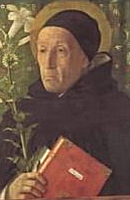 |
|
Meister Eckhart
Meister Eckhart – theologian, psychologist, philosopher, mystic – has become more and more appreciated the longer he has been dead. In recent times, thinkers as varied as Eric Fromm, Dag Hammerskold, Matthew Fox and Eckhart Tolle have all acknowledged his inspiration in their teaching.
|
Born in Thuringia in 1260, Eckhart joined the Dominican Order at the age of 15, and continued to serve this order in various ways until he died in 1328 – in church custody and facing charges of heresy. He taught theology at the University of Paris, acquiring here his title ‘meister’, which means ‘master’. But most of his life was spent away from academia, leading monastic communities in Erfurt, Strasburg and Cologne. In a century of flowering female spirituality, he was a supportive figure to many Dominican nuns and women in the burgeoning lay communities, so hated by the authorities.
Meanwhile, the church leadership was in crisis. The papacy, exiled in Avignon, was involved in unedifying power struggles, while the Franciscan-led Inquisition was turning against its rival the Dominican order. In a time of insecurity, Eckhart’s daring talk of inner spiritual experience was considered dangerous.
It was his sermons that gave full scope to his adventurous thought. He pictured God as an abundant spring overflowing into the world, while he named detachment above love as the greatest virtue. In this, he echoed Buddhist teaching, as he also did in his emphasis on nothingness and the emptying of self. He believed God too precious to name, and even said in one sermon that ‘we must take leave of God’.
The church condemned him after he died, attacking his memory with either slander or a veil of silence. But through followers like Henry Suso and John Tauler his thought lived on, while nuns of the South Rhineland committed his sermons to memory and wrote them down. The Pope declared Eckhart ‘evil-sounding, rash and suspect of heresy,’ but many have begged to differ.
|